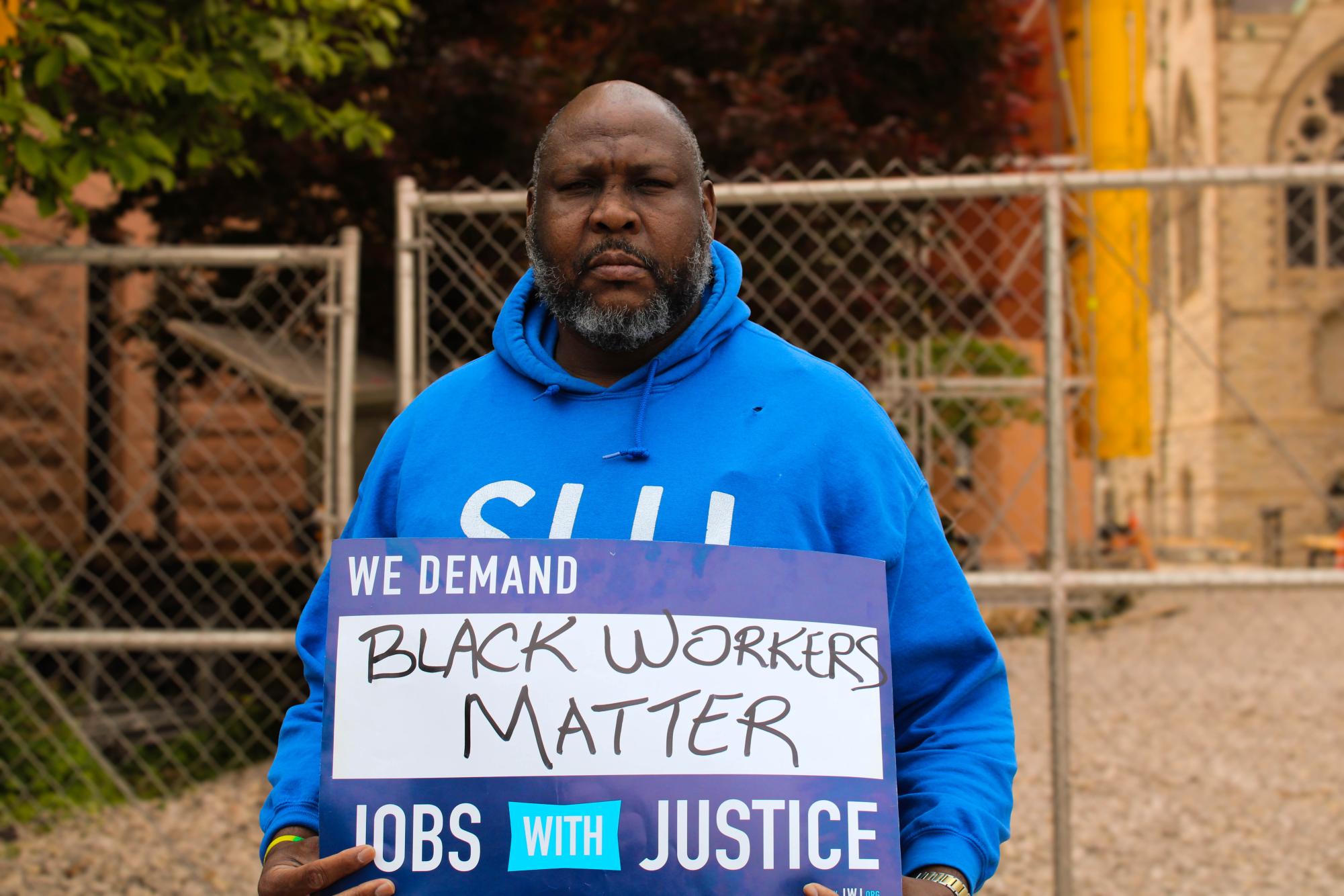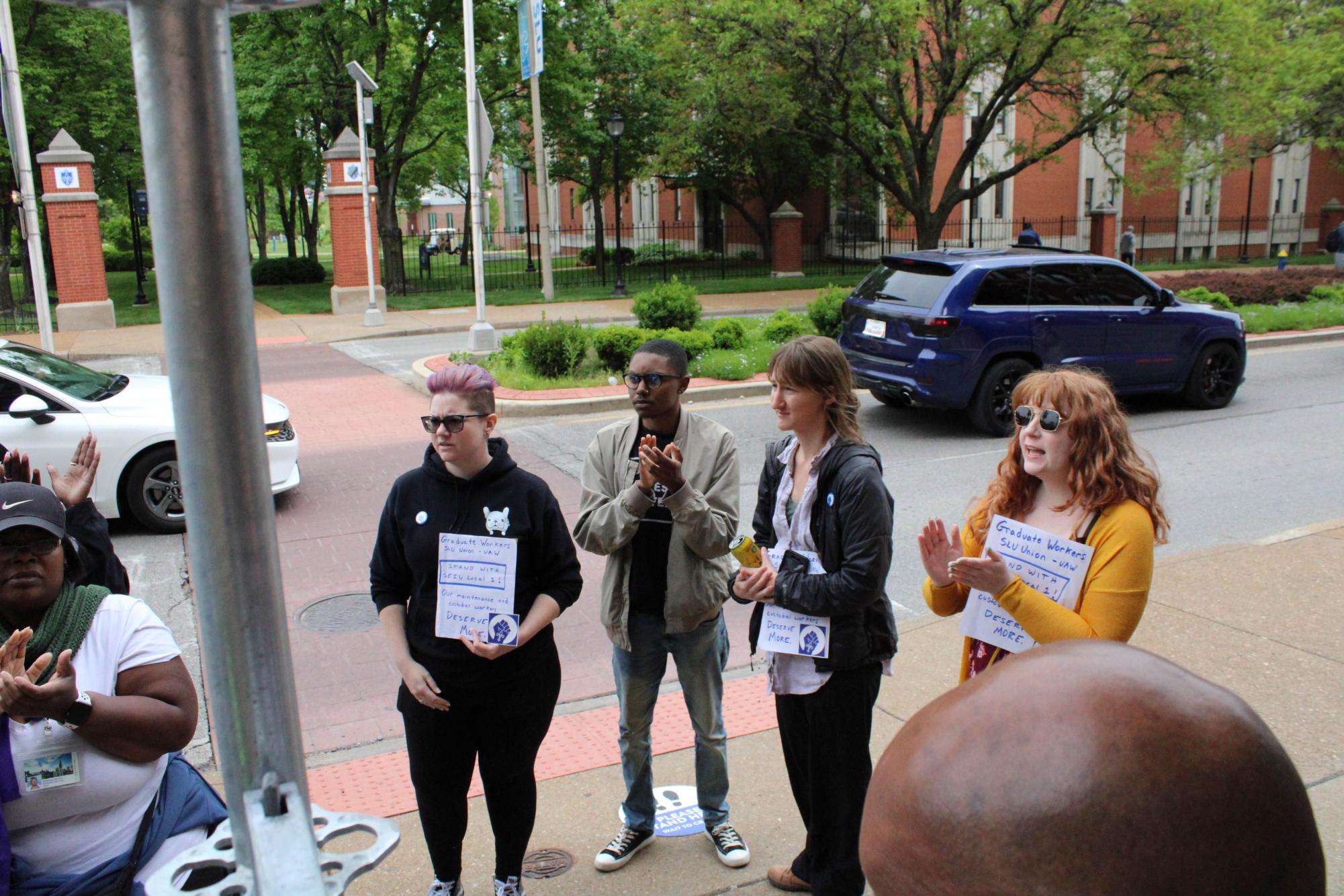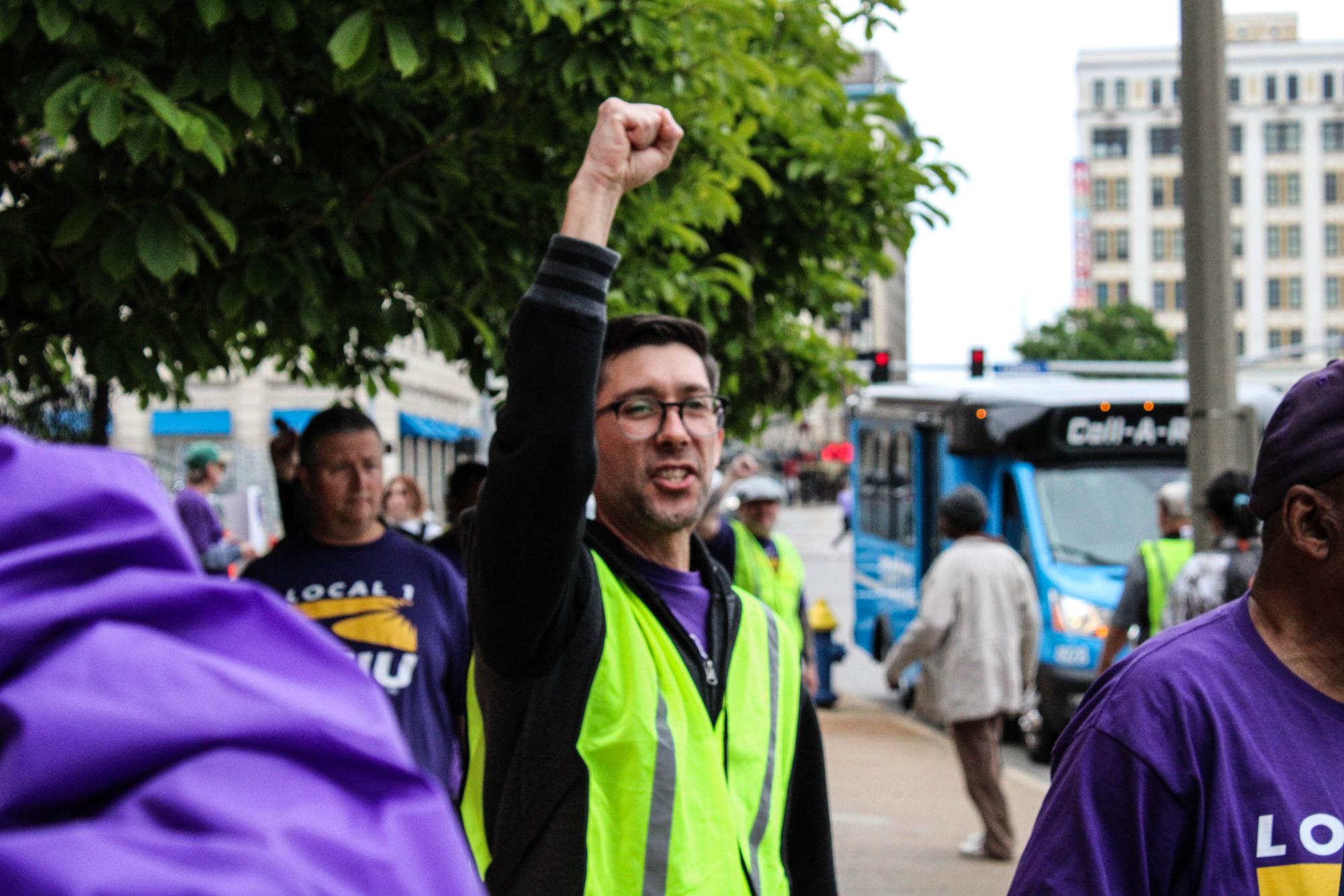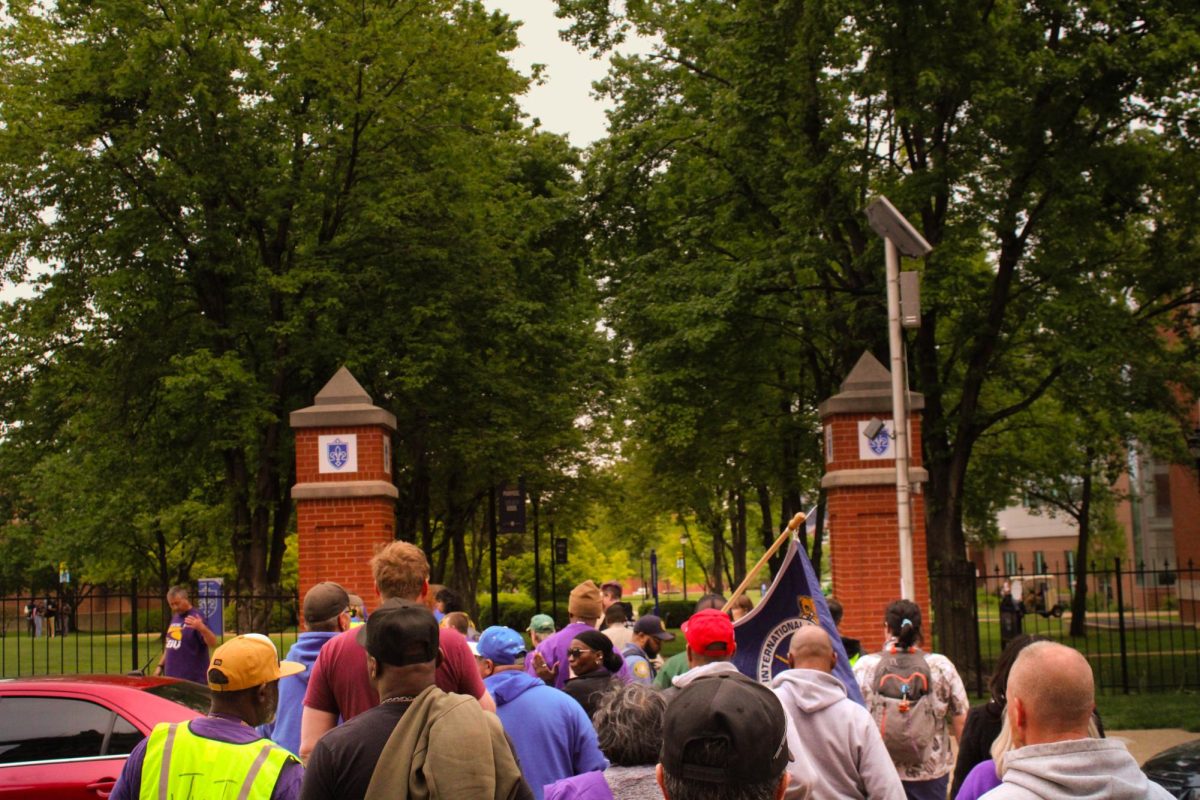Employees at Saint Louis University claim the university continues to offer an “unacceptable wage package,” one that they have overwhelmingly turned down three times as SLU’s negotiation team offers little change.
The employees consist of Service Employees International Union local 1 janitors, ground and maintenance crew workers on campus. They claim as a collective that they are being underappreciated by the university despite ensuring a clean and safe campus environment.
About 25 union workers gathered in front of the Busch Student Center on Thursday, April 25, in protest of SLU’s wage package and subsections within the contract.
According to a website made by the workers, “SLU is demanding a four-year agreement with insufficient wage increases and unfavorable outsourcing language that threatens these working peoples’ jobs and livelihoods.”
As of now, SLU’s custodial staff is making around $15 an hour and groundskeeping staff makes around $19 an hour. Both are considered essential workers by SLU, which means that on days where class is canceled due to weather, emergencies or other cancellations, these workers still have to show up.
Sonya Harris, a custodial employee as well as a shop stewardess, has worked at SLU for 17 years. Now, most of her work is in Ritter Hall where she cleans every classroom entirely.
Harris helped organize the protest, in an effort to convey her frustrations with the contract negotiations and understaffing issues.
“We are very short staffed,” Harris said. “We are about seven people short to their standards, but in my opinion, we need at least 10 or 12 more people.”
Harris echoed the sentiments of many others at the protest that their work is often overwhelming, and they may not be able to always complete all of their tasks by the end of their shifts.
“That’s why we need more staff because we don’t have enough to be in the dorms and the buildings. The buildings will get neglected if you don’t have enough staff,” Harris said.
Harris explained that what her and the other staff want is a living wage. She said that most of the staff, including herself, have second jobs.
Harris does administrative data entry for medical facilities from home to supplement her income. Her hope is to become an administrator at either a hospital or a nursing facility.
Another employee who works in custodial services for the past five years, Mitchell Hughes, mainly works with setting up different events that SLU hosts, also has a second job. He has had his own security business since he was 16, lasting 40 years.

“We’re getting paid the equivalent of a Burger King worker,” Hughes said. “I would like to be appreciated, but for me, appreciation is the bottom line.”
Hughes explained that his current wage is not enough to support his family which consists of his wife, nine children and nine grandchildren.
“My daughter is 17, and she makes more money than I make. She makes $17 an hour. She works at St. Louis Bread Company,” Hughes said.
Hughes resonated with Harris’s statements in understaffing.
“The reason we don’t have help is because they don’t want to pay [for the help],” Hughes said.
Groundskeeper Tommy Wessel, has worked for SLU for 17 years. His work requires him to be outside all day, and sometimes night.
“Everything you see outdoors is affected by us,” Wessel said. “Whether it be the concrete, trees, flowerbeds, the grass or the trash. Everywhere from campus, to the parking lots, including lots off of campus.”
Wessel said with graduation coming up and understaffing concerns, they just can not keep up. As of now, there are about 12 to 14 groundskeepers maintaining the entire campus. According to Wessel, there should be about 18 to 20, but he thinks there should be even more.
“We’ve asked if they are going to hire anybody, and they say they can’t hire anybody when there is a contract dispute,” Wessel said, concerned of ongoing end-of-year pressures.
“We’re not asking for something outrageous,” Hughes said. “When you come on to this university’s campus, you look at the grounds. You don’t see trash floating around this place. When you go inside, the trash cans are empty, the floors are clean. All of these things are important.”

“We voted [contracts] down three times now. The last time we voted it down, we went back the next day, and they said ‘No, that was our offer. Go vote on that again.’”
Harris said that custodial services are looking to get at least $17 an hour. Instead, she said that SLU has offered them a $1.75 incremental pay increase over a three year contract. Comparatively, the groundskeepers are asking for a minimum increase of $3.
“SLU has a lot of money. It will not hurt them to pay us that,” Harris said. “We feel very disrespected with the offer they came back with, and they’re not willing to change it.”
Harris also noted that SLU offered a signing bonus in the contract.
“They’re offering a signing bonus, which is not really a bonus because they’ve given that as a gift to other employees [before],” Haris said. “I really feel that should not even be a part of the negotiation and should just be a part of appreciation for us.”
Harris added that many workers are afraid of losing their jobs because their contract has a clause that permits the university to sub-contract out other employees while giving current employees only a 30 day notice of their replacement.

According to Wessel, they are already outsourcing custodial positions in the south campus, as there are no SLU specific custodians working there. Recently, he said he noticed outsourced contractors laying mulch on the north campus at the art museum.
“There were contractors in there taking care of that they’ve contracted out,” Wessel said. “When I asked why we weren’t going to do that. We were told ‘well, you know, you just can’t get to everything.’ Hire guys. We will get to it.”
Wessel expressed worries of sub-contracting out external workers outside of their job security, but also in the level of care those contractors will produce. This worry stems from the fact that most of SLU’s groundskeepers have worked for SLU on average 15 years, according to Wessel.
“I think that shows a level of care and commitment that you don’t get with some company that comes in and gets the job done, and they work quickly.”
Wessel said that he and other groundskeepers even keep an eye out for those who are peering into cars looking for something to steal. He said they always report it because of their genuine care for the students.
“There’s so many people that stop us as we walk across campus and recognize this. There’s a level of familiarity with students, professors and with office employees,” Wessel said. “I think that makes people comfortable seeing the same people each day in and day out, as opposed to just some random people that come and want to get their work finished and get up out of here.”
Wessel said that last year, SLU gave their maintenance workers a $5 raise because they were leaving to work at other schools, mainly Washington University.

“There are people who are scared of speaking up,” Wessel said. “They say, ‘well, if we make too much of a stink, they’re just going to get rid of us.’”
Similarly, others such as Hughes, said they simply want “a fair contract and a fair length of time.”
“Students have said ‘hey, all things being equal between here [and other schools], we chose this [SLU] because of the way the grounds look,’” Wessel said. “You just want to go to work, do your job and not have to deal with the B.S. outside of it. Everyone just wants to be happy in their job.”
Mia King, the bargaining agent for grounds, custodial and distribution workers, said the most important thing she is tackling is job security.
“They can give us a $5 an hour raise today, and then subcontract all our work out in 30 days. So that’s not helpful for us,” King said.
According to John (J.P.) Hasman, the lead negotiator for the president’s office, the existing subcontracting language has existed in the contract without issue since the 1970s, he explained via email.
“We just want some protections for these workers,” King said. “Some of them have worked here for 20 years plus. They deserve to know that their jobs are safe. That’s the biggest part, and SLU has basically ignored that.”
King also said that they have attempted to meet with president Pestello four times now, as he is the deciding factor alongside the board of trustees in the contract.
“All four times, he’s not there,” King said. “We have not had one conversation with him.”
King added that they even went as far to ask Alderwoman Megan Green to write a letter on their behalf; still, no response.
“The only thing I want to know is why President Pestello won’t meet with us,” King said. “His interests are not in these workers.”
In an email to The University News from President Pestello, he said he is committed to ensuring that the union workers and all SLU employees continue to be treated with fairness, dignity and respect.
“As negotiations with the union continue, I want to reaffirm my deep appreciation for the essential work that our custodial, grounds and distribution staff do every day,” Pestello said.
Pestello added that he remains optimistic about reaching an agreement that recognizes their valued contributions to the University.
“Amid the many challenges and uncertainties facing all universities, we are proud to have offered our dedicated facilities workers a contract with historic pay increases and unmatched benefits,” Pestello said.
SLU offered the union three contract options: a three-year contract, a four-year contract and a five-year contract.
The three-year contract consists of a $2.25 raise over the three years with a $150 ratification bonus. The raise would bring grounds and delivery wages to $21.25 and custodians’ to $17.25.
The four-year contract consists of a $3 raise over the four years with a $1,250 ratification bonus. The raise would bring grounds and delivery wages to $22 and custodians to $18.
The five-year contract consists of a $3.25 raise over the five years with a $1,250 ratification bonus. The raise would bring grounds and delivery wages to $22.25 and custodians to $18.25.
“These offers also include increasing their sick days, increasing their emergency call in pay to double time, continuing to fully subsidize employee health insurance, and our retirement match and tuition program providing almost free tuition to these employees and their children,” Hasman said. “These benefits are unmatched in our area.”
During the protest, the union workers emphasized that they wanted their raises now and to not be trapped into a long contract for adequate compensation.
“Given the recent communication from the President’s Office about our current year budget deficit and continued uncertainties related to delays in enrollment brought about by the FAFSA delays and pressures on higher education generally, the university believes our offers with guaranteed meaningful increases recognizes the valued contributions of our colleagues in light of these realities,” Hasman said.
The union employees remain hopeful that they will reach an agreement that favors their work.
“Without our work, the business would not run as it does. Even students have given input and say we’re needed and they appreciate us,” Harris said. “We feel more appreciated by our students than we do by our higher ups.”











